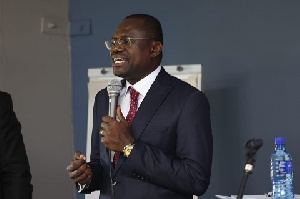Accra, Jan. 18, GNA - Stakeholders on global food security, have pledged their commitment to help people exposed to the risk of food and nutrition insecurity and build their resilience in the face of grave economic, climatic and environmental threats.
Mr. David Nabarro, Special Representative of the Secretary-General on Food Security and Nutrition who made the pledge said: "The UN system - FAO, WFP, IFAD, UNDP and the World Bank have been working together with my High-Level Task Force on food security."
He made the pledge in a message to the on-going Summit of the World's Regions on Food Security in Dakar, Senegal.
A statement issued in Accra on Monday by the United Nations Information Centre quoting Mr. Nabarro said "in recent years, we have witnessed the collapse of food security for the world's most vulnerable communities. The global economic downturn has caused high food prices and reduced buying power - a disastrous combination. Hundreds of millions more people cannot afford to feed themselves or their families". He said many factors had played their part in creating this crisis, one of them was the inability of farmers to produce enough food to meet demand.
"Farmers face volatile markets, which offer prices that are sometimes too low to cover their costs. Meanwhile, seeds and fertilisers can be too expensive. Those who produce food often experience difficulties in getting their goods to markets at the right price, since the structure of trading systems often works against them," he added. Mr. Nabarro noted that smallholder farmers were hit particularly hard, their problems were exacerbated by credit shortages, lack of access to technology and the impact of climate change. He said women who did most of the farming in the world's poorest communities, suffer their own particular ill-effects from food insecurity and when times were difficult, they must make stark choices between childcare and income-earning. "Disproportionate numbers of women and children experience under-nutrition and nutritional deficiency. We must do a better job of listening to these smallholders and women farmers, and involving them in our response, "he said.
Mr. Nabarro pointed out that civil society, the private sector and governments were working more concertedly at several levels, while world leaders had become increasingly outspoken on the need for a sustained response to food and nutrition insecurity. He said African leaders had committed themselves to increasing investments in agriculture, infrastructure and food processing, especially for smallholders, and to strengthening social protection programmes, safety nets and direct assistance to the hungry. "Similar twin-track initiatives have emerged in Asia and Latin America, " he said. World leaders at last year's G20 summits in London and Pittsburgh, and at the G8 Summit in L'Aquila in July, agreed on a comprehensive, country-led and co-ordinated approach to food security, and on a programme of long-term investment to support it. It is at the local and regional levels that such initiatives need the greatest support. Mr. Nabarro commended President Abdoulaye Wade, the Government of Senegal, and the Forum of Global Associations of Regions for convening the meeting, which he said was an opportunity to engage in decentralised co-operation on food security.
General News of Monday, 18 January 2010
Source: GNA












